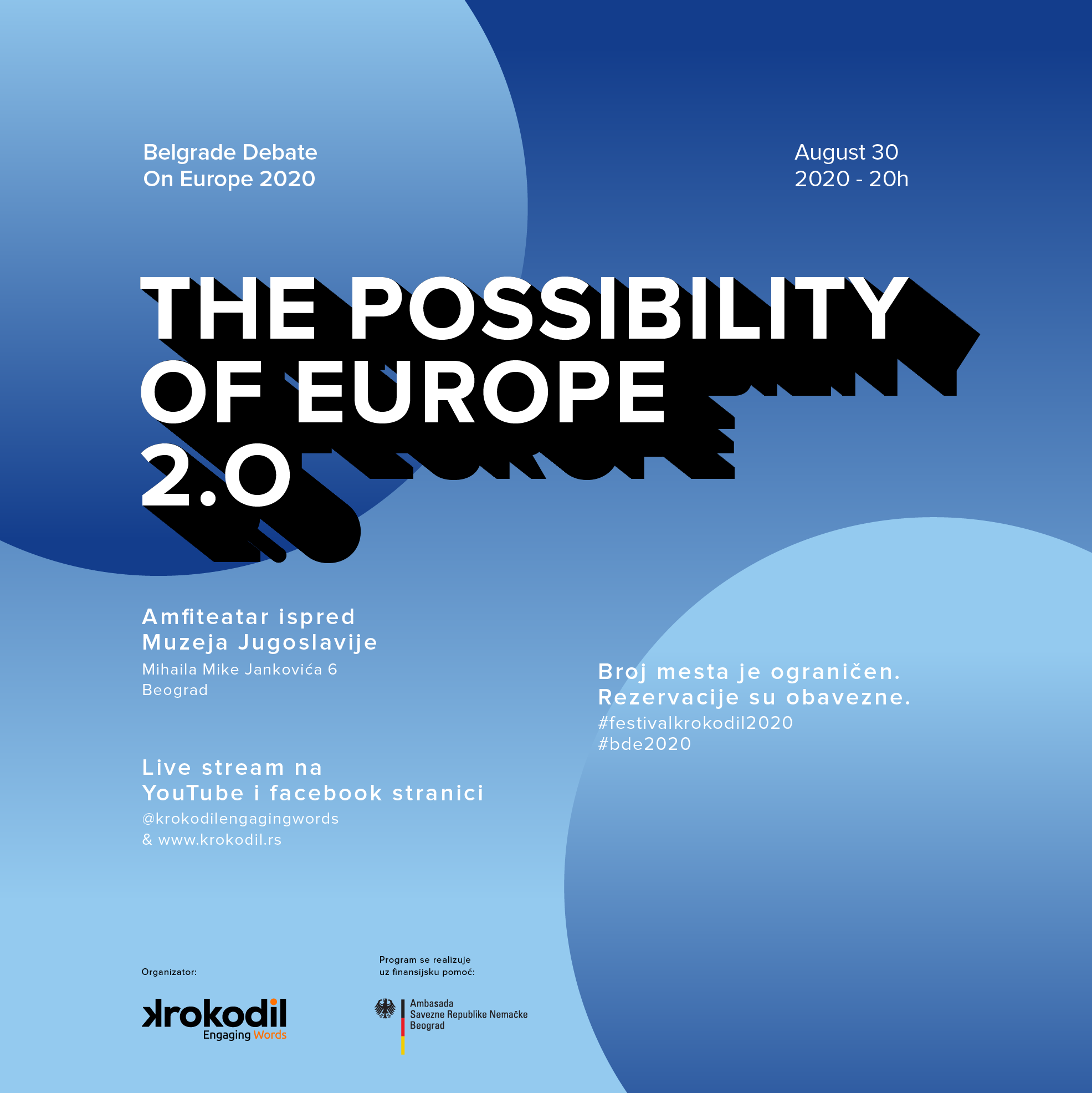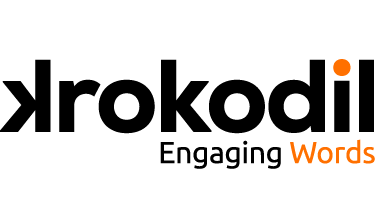
24 Aug BELGRADE DEBATE ON EUROPE: THE POSSIBILITY OF EUROPE 2.0
12 KROKODIL FESTIVAL 2020
BELGRADE DEBATE ON EUROPE: “THE POSSIBILITY OF EUROPE 2.0”
SUNDAY, AUGUST 30, 2020, 8 pm
Mihaila Mike Jankovića 6, Belgrade
Official language of the debate is English.
Belgrade Debate on Europe 2020 entitled “The Possibility of Europe 2.0” will be held as the third and last evening of the KROKODIL literary festival on Sunday, August 30, starting at 8pm at the open air arena in front of the Museum of Yugoslavia in Belgrade. It will gather together some of the most eminent European and regional intellectuals and experts from various fields (artists, writers, cultural workers, professionals and theoreticians, sociologists, historians, philosophers, activists etc.) In the framework of three distinct debate cycles we will deal with some of the most important questions that both Europe and the Europeans are facing today. The main underlying topic of the Fourth Belgrade Debate on Europe will be the COVID-19 pandemic and its’ global and more particularly European implications.
The debate cycles of this years’ Belgrade Debate on Europe are:
- The Future of Stabilocracies (in the Wake of the COVID-19 Pandemic)
- Central Europe Between (E)Utopian Dreams and Dystopian Realities
- New Normal
DEBATE #1: THE FUTURE OF STABILOCRACIES (IN THE WAKE OF THE COVID-19 PANDEMIC)
Due to the rise of right wing populism and steady growth of Anti-European parties and movements as well as the emergence of authoritarian political leaders both outside the EU and within it, the continuation of the enlargement policy does not seem possible without providing support to the part of the population that actively connects the EU with positive attitudes and experiences. On the other hand, the sudden and unexpected change of the global paradigm fueled by the COVID-19 pandemic seems to further encourage these processes that lead Europe, but also the entire planet, further towards the even deeper withdrawal within the framework of national states fueling acute parochialism and even less tendency for mutual cooperation and openness. Are these processes definite and unavoidable or are they simply the instinctive recoiling in the face of the unknown and the wish for stability to be retained at all costs, even that of democratic values? Or maybe there still exists a potential for thorough change of the given course? These are all questions that the participants in the first round of this year’s Belgrade Debate on Europe will try to answer.
Participants: Florian Bieber (online), Boris Buden (online), Jelisaveta Blagojević
Moderator: Ljubica Gojgić
DEBATE #2: CENTRAL EUROPE BETWEEN (E)UTOPYAN DREAMS AND DYSTOPIAN REALITIES
In the second round of the Belgrade Debate on Europe, we will deal with the critical analysis of the dynamic relationship of specific cultural self-confidence characteristic of Central European countries and political, social, cultural and racial conservatism that have been on the rise in recent years. Does Europe really need to be protected from immigrants and refugees and all those who desperately want to be under its auspices? Should we build even taller walls, wind ever larger coils of barbed wire and keep tirelessly reminding ourselves of our (superior) inherent (Christian) values or even wage a ruthless war against all that we perceive as different in the name of Civilization? Is the idea of the irreconcilability of cultures forever rooted in Central European narratives? Participants in the second round of this year’s Belgrade Debate on Europe will try to shed light on some of these doubts.
Participants: Michał Kozłowski, Katarina Peović (online)
Moderator: Igor Štiks
DEBATE #3: NEW NORMAL
Although the term “new normal” is not really new at all – it was coined in 2008 on the occasion of the global financial crisis – it has undergone a detailed redefinition with the emergence of the new coronavirus in early 2020. The participants of the third round of the Belgrade Debate on Europe will try to provide sound replies to questions such as: What are the most important elements of the “new normal”? What kind of adjustment does the “new normal” require of societies and which of the individuals within the framework of politics, economics, cultural relations and contacts? What does all this together mean for the future of the European Union and what for the European continent as a whole? And, last but not least, are there any positive consequences of the “new normal” and if so, what are they?
Participants: Olle Bergman (online), Miguel Roan (online), Darija Medić
Moderator: Uroš Krčadinac
Due to the limited number of places, reservations are required at the e-mail address office@krokodil.rs.
Wearing protective masks is mandatory.
The event was supported by the Embassy of the Federal Republic of Germany in Serbia.
The German Embassy is happy to support a central event of this year’s KROKODIL festival, i.e. the Belgrade debate on Europe. Since 1st of July 2020 Germany holds the Presidency of the Council of the European Union. The German EU Presidency’s programme is very much focusing on the impact of the COVID-19 pandemic and its economic and social consequences throughout Europe. The objective is to help the EU emerge from the current crisis stronger, more united and with a new sense of solidarity. This is summed up in the slogan of the Presidency – “Together for Europe’s recoveryThe German Embassy is happy to support a central event of this year’s KROKODIL festival, i.e. the Belgrade debate on Europe. Since 1st of July 2020 Germany holds the Presidency of the Council of the European Union. The German EU Presidency’s programme is very much focusing on the impact of the COVID-19 pandemic and its economic and social consequences throughout Europe. The objective is to help the EU emerge from the current crisis stronger, more united and with a new sense of solidarity. This is summed up in the slogan of the Presidency – “Together for Europe’s recovery“..



Sorry, the comment form is closed at this time.